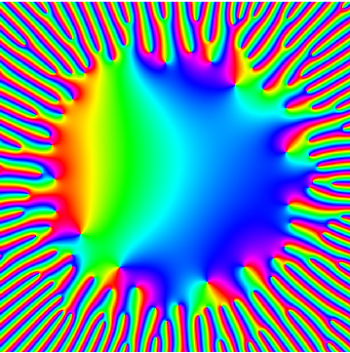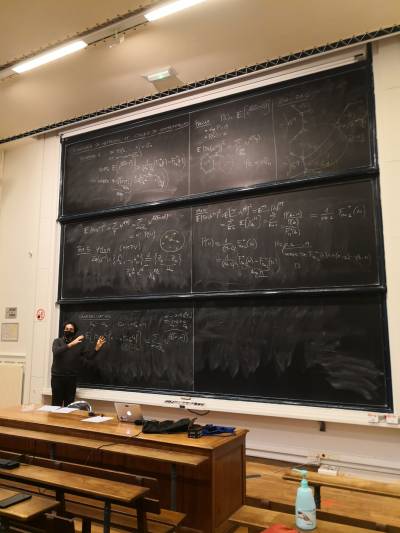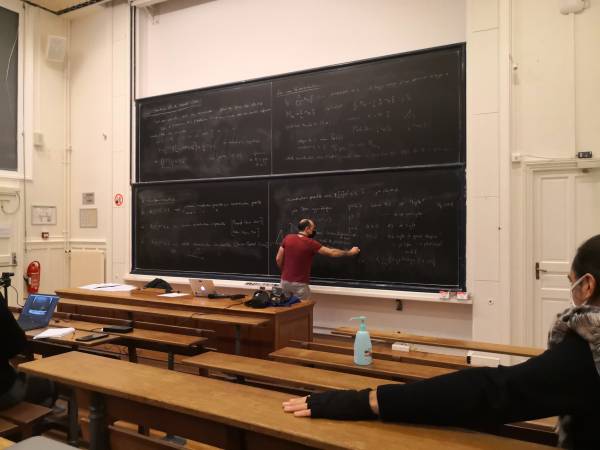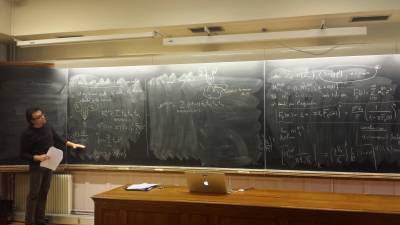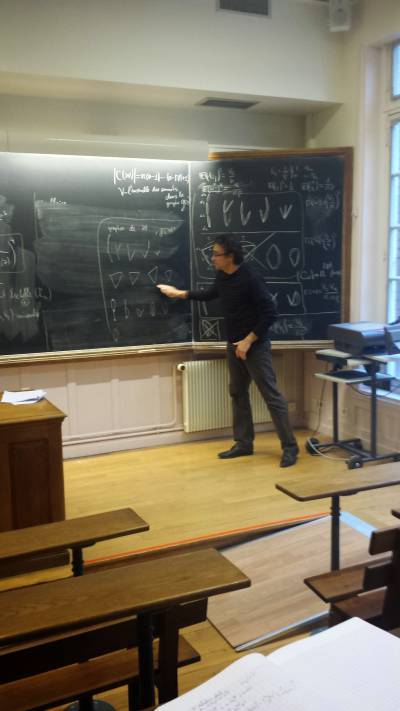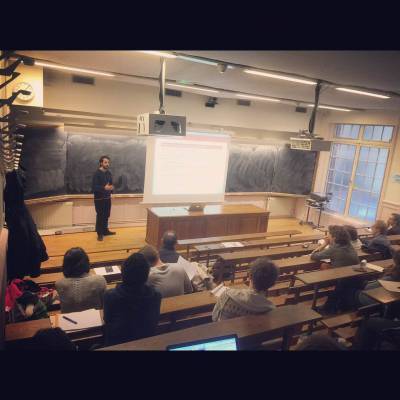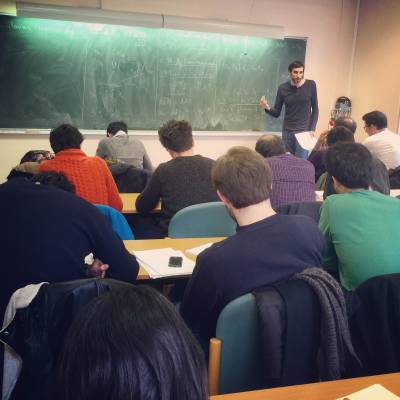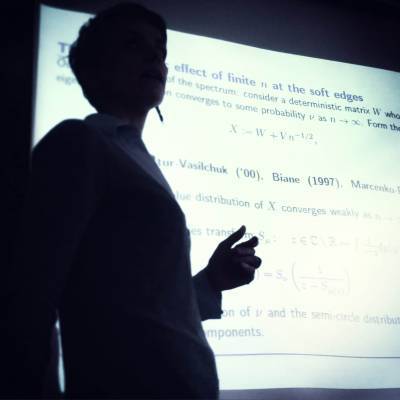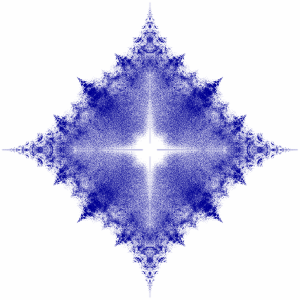Séminaire Matrices et graphes aléatoires (MEGA)
Les thèmes abordés incluent
- La théorie des matrices aléatoires : Universalité, théorie des probabilités libres et théorie des trafics, étude des statistiques spectrales linéaires, loi locales, polynômes caractéristiques de matrices aléatoires, grandes déviations, étude des matrices non-Gaussiennes;
- Les applications des matrices aléatoires : Machine learning, statistiques en grande dimension, information quantique, écologie, économie;
- Les graphes aléatoires : en particulier les méthodes spectrales dans l'étude des graphes aléatoires, matrices diluées;
- Des sujets connexes : Systèmes intégrables et modèles probabilistes intégrables, opérateurs aléatoires, gaz de Coulomb et Riesz, connexions avec des problèmes d'analyse géométrique asymptotique ou encore de théorie des nombres.
- Le séminaire a lieu environ un vendredi par mois, toute la journée:
- Le matin, un mini-cours à destination des thésards;
- L'après-midi, deux exposé de séminaire de 55min + 10min de questions.
- Lieu. Séminaire tournant. A Paris, à l'Institut Henri Poincaré, http://www.ihp.fr/.
- Financement. Nous sommes soutenus par le CNRS dans le cadre du GDR MEGA. Contacter Mylène Maïda pour demander un financement pour vos déplacements.
- Vidéos en ligne de certains exposés. Chaine Youtube du GDR MEGA
Prochaine séance
Vendredi 20 février, à Toulouse
- 10h30-12h00: Mini-cours de Camille Male Combinatoire de certaines matrices associées au réseaux de neurones.
Abstract: L'objectif de ce mini-cours est de présenter un point de vue issu de la théorie des matrices aléatoires dans le cadre de la méthode du gradient pour l'optimisation des réseaux de neurones. On s'intéresse au noyau Y(h) associé à un réseau à deux couches, dans le cas où les dimensions des espaces vectoriels sous-jacent sont grandes, dans l'échelle classique des matrices aléatoires : plus précisément, notre objectif est de comprendre la distribution de valeurs singulières d'une matrice aléatoire de la forme : Y(h)= \frac{1}{\sqrt N_2} h \{ \frac{WX}{N_0} \}, où X,W sont des matrices indépendantes à entrées i.i.d., et h est une fonction évaluée entrées par entrées. Nous montrerons comment la méthode des moments, couplée aux outils de probabilités libres, permet de montrer que ce matrice a la même distribution asymptotique de valeurs singulières qu'un polynôme très simple en des matrices aléatoires indépendantes.
- 14h00-15h00: Séminaire de Mohammed-younes GUEDDARI Spin glass analysis of stochastic generalized Lotka-Volterra systems with large random interaction matrices .
Abstract: The stochastic generalized Lotka-Volterra equations with symmetric interaction matrices are widely used to model the dynamics of species abundances in ecosystems subject to demographic noise. Following the pioneering work of May, we consider a regime in which the interaction matrix is large and random. We show that the invariant distribution of the resulting Markov process can be expressed as a random Gibbs measure. This structure allows for a rigorous analysis using spin-glass techniques developed in the theory of disordered systems. This presentation is based on the preprint https://arxiv.org/abs/2510.15754
- 15h30-16h30: Séminaire de Thomas Buc D'Alché Map enumeration with the Dumitriu-Edelman model.
Abstract: In the 70s, the works of physicists – in particular those of Brézin, Itzykson, Parisi, and Zuber – emphasized the strong links between map (graph embedded in a surface) enumeration and computation of observables in random matrix theory. The Dumitriu-Edelman model is a random tridiagonal matrix model whose eigenvalues are distributed according to the $\beta$-ensemble, a distribution which interpolates between the eigenvalue distributions of several Gaussian matrix models. In this talk, I will present an approach based on the model of Dumitriu and Edelman. It allows to express observable of random matrix theory in terms of well-labelled hypermaps, studied by Bouttier, Fusy, and Guitter. In particular, this allows to compute quantities related to distances in a planar map.
Année 2025-2026
* Organisateurs 2024-2025.
* Vendredi 10 octobre, à l'IHP
- 10h30-12h00: mini cours par Adrien Hardy Grandes matrices de covariance en pratique.
- 14h00-15h00: Kohei Noda Partition functions of two-dimensional Coulomb gases with circular root- and jump-type singularities .
- 15h30-16h30: Valentin Pesce The Dyson equation on the circle through the theory of viscosity solutions .
* Vendredi 21 novembre, à l'IHP
- 10h30-12h00: mini cours par Thibaut Lemoine Théorie de Yang-Mills en 2D : une approche via les probabilités intégrables.
- 14h00-15h00: Maurice DuitsCritical Asymptotics in the Two-Matrix Model: From Painlevé Equations to the (3,4) String Equation.
- 15h30-16h30: Catherine Donati-Martin Extension d'un théorème de Wschebor au mouvement brownien matriciel et au mouvement brownien libre..
* Vendredi 5 décembre, au CMLS à l'Ecole Polytechnique
- 10h30-12h00: mini cours par Stéphane Dartois Une sélection de problèmes sur les tenseurs aléatoires..
- 14h00-15h00: Nizar Demni Support de la mesure de Brown de la compression du mouvement brownien unitaire libre. .
- 15h30-16h30: Rémi Bonnin Un théorème de Wigner pour les tenseurs aléatoires.
* Vendredi 16 janvier, à l'IHP
- 10h30-12h00: mini cours par Alex Little Dyson-Schwinger equations for Beta-Ensembles .
- 14h00-15h00: Jean-Christophe Mourrat Operator l^\infty → l^\infty norm of products of large random matrices.
- 15h30-16h30: Philippe Biane Matrices aléatoires, convolution libre et formule de Lévy-Khinchine non-linéaire .
* Vendredi 20 février, à Toulouse
- 10h30-12h00: mini cours par Camille Male Combinatoire de certaines matrices associées au réseaux de neurones.
- 14h00-15h00: Mohammed-younes GUEDDARI Spin glass analysis of stochastic generalized Lotka-Volterra systems with large random interaction matrices .
- 15h30-16h30 Thomas Buc D'AlchéMap enumeration with the Dumitriu-Edelman model.
* Vendredi 13 mars, à l'IHP
- 10h30-12h00: mini cours par Marc Potters .
- 14h00-15h00: Pierre Bousseyroux .
- 15h30-16h30: Charlie Herent .
* Vendredi 10 avril, à l'IHP
- 10h30-12h00: mini cours par Alessandra Occelli .
- 14h00-15h00: Jonathan Husson.
- 15h30-16h30: Carla Mariana da Silva Pinheiro .
* Vendredi 29 mai, à l'IHP
* Vendredi 19 juin, à l'IHP
Année 2024-2025
- Organisateurs 2024-2025.
- Vendredi 11 octobre, séance commune avec Random Tensors and Related Topics. Amphi Choquet-Bruhat
- 10h30-12h00: mini cours par Afonso Bandeira Towards a sharp non-asymptotic theory for structured random matrices (and tensors).
- 14h00-15h00: Henrique Goulart Spiked tensor models through the prism of random matrix theory.
- 15h30-16h30: Yizhe Zhu A non-backtracking method for tensor completion.
- Vendredi 15 novembre, à l'IHP, salle Grisvard (314).
- 10h30-12h00: mini cours par Alice Guionnet Random matrices with heavy tailed entries.
- 14h00-15h00: Fanny Augeri Grandes déviations du spectre de graphes d’Erdös-Rényi sparse surcritiques.
- 15h30-16h30: Sofia Tarricone Intégrabilité des noyaux d'Airy et sinus à température finie.
- Vendredi 6 décembre, à l'Ecole Polytechnique.
- 10h30-12h00: mini cours par Jérémie Bouttier Énumération de cartes planaires: des intégrales matricielles aux fractions continues.
- 14h00-15h00: Alice Contat Coeurs critiques de graphes aléatoires.
- 15h30-16h30: Charles Bertucci A PDE point of view on some question about random matrices.
- Vendredi 10 janvier, à l'IHP, salle Grisvard (314).
- 10h30-12h00: mini cours par Nicolas Tremblay Introduction to Determinantal Point Processes and Applications.
- 14h00-15h00: Gregory Schehr Linear Statistics for Coulomb and Riesz gases: higher order cumulants.
- 15h30-16h30: Sarah Timhadjelt Spectral gap of quantum channel obtained with Haar distributed unit matrices.
- Vendredi 7 février, à Toulouse.
- 10h30-12h00: mini cours par Cécilia Lancien Tensor product random matrix models and spectrum of random quantum channels.
- 14h00-15h00: Johannes Alt Brown measures for deformed $L^\infty$-valued circular elements.
- 15h30-16h30: Issa-Mbenard Dabo. Traffic analysis of the random feature model with variance profiled data.
- Vendredi 14 mars, à l'IHP, salle Grisvard (314).
- 10h30-12h00: mini cours par Guillaume Barraquand La paysage dirrigé..
- 14h00-15h00: Guilhem Semerjian Matrix denoising via low-degree polynomials.
- 15h30-16h30: Alex Little The partition function of Beta-ensembles with complex potentials.
- Vendredi 4 avril, à l'IHP, salle Grisvard (314).
- 10h30-12h00: mini cours par Laurent Massoulié Introduction to pseudo-random graphs.
- 14h00-15h00: Barbara Pascal The Kravchuk transform: a novel covariant representation for discrete signals amenable to zero-based detection tests.
- 15h30-16h30: Younes Gueddari Approximate Message Passing for non-symmetric large random matrices.
- Vendredi 16 mai, à l'IHP, salle Grisvard (314).
- 10h30-12h00: mini cours par Anna Maltsev Bulk Universality for Non-Hermitian Wigner-type Matrices.
- 14h00-15h00: Ella Hiesmayr The spectral edge of Erdős-Rényi graphs with constant average degree.
- 15h30-16h30: Mohammed Osman Eigenvector Overlaps for non-Hermitian Random Matrices.
- Vendredi 13 juin, à l'IHP, salle Grisvard (314).
- 10h30-12h00: mini cours par Yan Fyodorov Grassmann integration approaches to eigenvector statistics of Non-Hermitian random matrices.
- 14h00-15h00: Thomas Buc d'Alché Topological expansion of unitary integrals and maps.
- 15h30-16h30: Mark Crumpton Eigenvector Self-Overlaps In The Ginibre Ensembles And Beyond.
Année 2023-2024
- Organisateurs 2023-2024.
- Vendredi 20 octobre, à l'IHP, salle Mirzakhani (201).
- 10h30-12h00: mini cours par Walid Hachem Grands systèmes aléatoires écologiques de Lotka-Volterra : un état des lieux succinct.
- 14h00-15h00: Camille Male Circularité au-dessus du groupe symétrique pour les étalements de grands tenseurs aléatoires.
- 15h30-16h30: Laure Dumaz Some aspects of the Anderson Hamiltonian in 1D.
- Vendredi 17 novembre, à l'IHP, salle Mirzakhani (201).
- 10h30-12h00: mini cours par David García-Zelada Polynôme caractéristique et rayon spectral.
- 14h00-15h00: Valentina Ros Counting equilibria of high-dimensional systems of random dynamical equations: an example from theoretical ecology.
- 15h30-16h30: Elba Garcia-Failde The master relation that simplifies maps and frees cumulants.
- Vendredi 8 décembre, à l'IHP, salle Mirzakhani (201).
- 10h30-12h00: mini cours par Giambattista Giacomin Disordered Ising chains and products of random transfer matrices.
- 14h00-15h00: Simon Coste The eigenvectors of non-Hermitian matrices.
- 15h30-16h30: Jana Reker Multi-Point Functional CLT for Wigner Matrices.
- Vendredi 12 janvier, à l'IHP, salle Mirzakhani (201).
- 10h30-12h00: mini cours par Pierre Tarrago Introduction au problème de Horn probabiliste.
- 14h00-15h00: Quentin François Analyse asymptotique du polynôme caractéristique de l’ensemble de Ginibre elliptique.
- 15h30-16h30: Thibaut Lemoine Variables aléatoires gaussiennes discrètes, partitions aléatoires et développement topologique.
- Vendredi 9 février à Toulouse.
- 9h15-10h45: mini cours par Manon Defosseux théorie des représentations et matrices aléatoires : quelques exemples essentiels.
- 11h00-12h00: Guillaume Barraquand Percolation de dernier passage dans une bande.
- 14h00-15h00: Colloquium du département par Christophe Garban Continuous spin systems, topological phase transitions and roughening.
- 15h30-16h30: Ronan Memin CLT for the Lax matrix of some integrable systems, and for high temperature beta ensembles.
- Vendredi 15 mars, à l'IHP, salle Mirzakhani (201).
- 10h30-12h00: mini cours par Guillaume Poly Méthode de Stein et application aux fluctuation des statistiques linéaires des Beta-ensembles.
- 14h00-15h00: Charles Bordenave Spectre des matrices de Toeplitz bruitées.
- 15h30-16h30: Slim Kammoun Traces de mots de permutations .
- Vendredi 5 avril, à l'IHP, salle Grisvard (314).
- 10h30-12h00: mini cours par Djalil Chafaï Logarithmic Sobolev inequalities.
- 14h00-15h00: Yuan Wangjun Hitting probability of Gaussian random fields and collision of eigenvalues of random matrices.
- 15h30-16h30: Aron Wennman A PDE approach to polynomial Bergman kernels and planar orthogonal polynomials.
- Vendredi 17 mai, à l'IHP, salle Mirzakhani (201).
- 10h30-12h00: mini cours par Maxime Février An invitation to noncommutative probability.
- 14h00-15h00: Nick Simm Derivative moments of CUE characteristic polynomials.
- 15h30-16h30: Félix Parraud The free energy of matrix models and application to map enumeration and the microstates free entropy.
- Vendredi 14 juin, à l'IHP, salle Mirzakhani (201).
- 10h30-12h00: mini cours par Jérémie Bouttier Énumération de cartes planaires: des intégrales matricielles aux fractions continues..
- 14h00-15h00: Sandrine Dallaporta Rate of convergence of empirical measures of hyperuniform point processes.
- 15h30-16h30: Charlie Dworaczek Guera The high-temperature regime of $\beta$-ensembles.
Année 2022-2023
- Organisateurs 2022-2023.
- Vendredi 25 novembre, à l'IHP, salle 314.
- 10h30-12h00: mini cours par Laure Dumaz Opérateurs à la limite de divers modèles de matrices aléatoires.
- 14h00-15h00: Pierre-Loïc Méliot Asymptotique de l'indice majeur d'une permutation aléatoire dans une classe RSK.
- 15h30-16h30: Philippe Biane Processus d'exclusion simple quantique et cumulants libres.
- Vendredi 16 décembre, à l'IHP, salle 314.
- 10h30-12h00: mini cours par Lucas Benigni Vecteurs propres de matrices de Wigner.
- 14h00-15h00: Vanessa Piccolo Asymptotic spectral density of nonlinear random matrix model via cumulant expansion.
- 15h30-16h30: Antoine Maillard Phase retrieval with random matrices: phase transitions and optimal spectral methods.
- Vendredi 13 janvier, à l'IHP, salle 201.
- 10h30-12h00: mini cours par Guillaume Dubach Valeurs propres extrêmes des perturbations non-hermitiennes de rang un.
- 14h00-15h00: Edouard Maurel-Segala Modèles matriciels unitairement invariant à basse température.
- 15h30-16h30: Jérôme Dedecker Coefficients de couplage pour la marche aléatoire sur $GL_d(R)$.
- Vendredi 17 février, à Toulouse.
- 10h30-12h00: mini cours par Manon Defosseux Théorie des représentations et matrices aléatoires : quelques exemples essentiels.
- 14h00-15h00: Félix Parraud Interpolation between random matrices and free operators.
- 15h30-16h30: Cosme Louart Estimation of $(I_n−XDXT)^{−1}$ with large dependence and concentration hypotheses.
- Vendredi 10 mars, à l'IHP, salle 314.
- 10h30-12h00: mini cours par Thierry Lévy Processus déterminantaux et sous-graphes aléatoires Notes associées au mini-cours.
- 14h00-15h00: Fanny Augeri Grandes déviations de la plus grande valeur propre de matrices de Wigner sparse.
- 15h30-16h30: Olivier Guédon La conjecture de la variance pour les boules unités des classes de Schatten $S_p^n$.
- Vendredi 14 avril, à l'IHP, salle 314.
- 10h30-12h00: mini cours par Grégory Schehr Random matrices and trapped fermions.
- 14h00-15h00: Imane Akjouj Étude de l’équilibre de grands systèmes de Lotka-Volterra via l’algorithme de l’AMP (Approximate Message Passing).
- 15h30-16h30: Maxime Février Fluctuations des statistiques spectrales linéaires pour des polynômes en une matrice de Wigner et une matrice diagonale déterministe.
- Vendredi 12 mai, à l'IHP, salle 314.
- 10h30-12h00: mini cours par David Dereudre Number-Rigidity for point processes.
- 14h00-15h00: Thomas Leblé
- 15h30-16h30: Harriet Walsh Partitions aléatoires sous la mesure de Plancherel—Hurwitz et cartes à grand genre.
- Vendredi 30 juin, à l'IHP, salle 201.
- 10h30-12h00: mini cours par Ion Nechita Introduction to random quantum channels.
- 14h00-15h00: Maria Jivulescu Random Positive operator valued measures.
- 15h30-16h30: Cécilia Lancien Quantum expanders - Random constructions & Applications.
Année 2021-2022
- Organisateurs 2021-2022.
- Vendredi 22 octobre, à Toulouse.
- 10h00-11h30: mini cours par Charles Bordenave Bord du spectre pour les graphes aléatoires parcimonieux. vidéo
- 13h30-14h30: Simon Coste Convergence of the characteristic polynomial of sparse matrices. vidéo
- 14h45-15h45: Raphael Ducatez Delocalization transition for critical Erdős–Rényi graphs. vidéo
- Vendredi 26 novembre, amphi Hermite.
- 10h30-12h00: mini cours par Nalini Anantharaman Théorèmes d'ergodicité quantiques.
- 14h00-15h00: Raphaël Butez Particules en dehors du support limite pour des gaz de Coulomb déterminantaux faiblement confinants.
- 15h30-16h30: Matteo Mucciconi Integrable cellular automata, free fermions and KPZ solvable models.
- Vendredi 17 décembre, amphi Hermite.
- 10h30-12h00: mini cours par Guilhem Semerjian Reconstruction sur l'arbre. vidéo
- 14h00-15h00: Guillaume Dubach Puissances de matrices aléatoires et cycles de commutateurs. vidéo
- 15h30-16h30: Djalil Chafaï Autour de matrices de Girko. vidéo
- Vendredi 21 janvier, salle 201.
- 10h30-12h00: mini cours par Camille Male Computational aspects of free convolution.
- 14h00-15h00: Jonas Jalowy The Wasserstein distance to the Circular Law.
- 15h30-16h30: Pierre Mergny Interpolating between classical and free convolutions.
- Vendredi 11 février, salle 201.
- 10h30-12h00: mini cours par Nicolas Curien Une introduction à la combinatoire des cartes et ses applications.
- 14h00-15h00: Paul Melotti The eight-vertex model via dimers.
- 15h30-16h30: Quentin Berger Directed polymers and the Stochastic Heat Equation with Lévy noise.
- Vendredi 25 mars, salle 201.
- 10h30-12h00: mini cours par Philippe Biane Probabilités libres et théorie des représentations.
- 14h00-15h00: François Simenhaus Probabilité de survie et localisation pour une marche aléatoire tuée par un processus de renouvellement.
- 15h30-16h30: Alix Deleporte Processus ponctuels déterminantaux et projecteurs spectraux des opérateurs de Schrödinger.
- Vendredi 15 avril, salle 201.
- 10h30-12h00: mini cours par Gaultier Lambert Approximations Gaussiennes pour les statistiques de matrices aléatoires unitaires.
- 14h00-15h00: Christophe Texier Fluctuations of random matrix products of SL(2,R) and the generalized Lyapunov exponent.
- 15h30-16h30: Jeanne Boursier Lois locales et TCL pour le gaz de Riesz circulaire.
- Vendredi 20 mai, séance délocalisée à Lyon, détails à venir.
- 10h30-12h00: mini cours par Alice Guionnet Large deviations for the largest eigenvalue of Wigner matrices.
- 14h00-15h00: Alessandra Occelli Time-time covariance for last passage percolation in half-space.
- 15h30-16h30: Guido Mazzuca From the Ablowitz-Ladik lattice to the circular β-ensemble.
- Vendredi 17 juin, salle 201.
- 10h30-12h00: mini cours par Valentin Feray Convergence mod-phi et estimées précises de déviations.
- 14h00-15h00: Sanjay Ramassamy Last-passage percolation on the complete graph and particle systems.
- 15h30-16h30: Anna Ben-Hamou Cutoff pour les chaînes de Markov permutées.
Année 2020-2021
- Organisateurs 2020-2021.
- Vendredi 13 novembre, en ligne.
- 10h30-12h00: mini cours par Alain Rouault Analyse spectrale et grandes déviations. vidéo
- 14h00-15h00: Camille Male Applications of Freeness over the diagonal of large random matrices. vidéo
- 15h30-16h30: Gregory Schehr Exact persistence exponent for the 2d-diffusion equation: from random polynomials to truncated random matrices. vidéo
- Vendredi 11 décembre, en ligne.
- 10h30-12h00: mini cours par Sylvia Serfaty Lois locales et fluctuations pour les gaz de Coulomb. vidéo
- 14h00-15h00: Alexandre Krajenbrink Fredholm determinants, exact solutions to the Kardar-Parisi-Zhang equation and integro-differential Painlevé equations. vidéo
- 15h30-16h30: Elliot Paquette The edge scaling limit of the Gaussian beta-ensemble characteristic polynomial. vidéo
- Vendredi 15 janvier, en ligne. Attention, horaire inhabituel l'après midi.
- Vendredi 5 février, en ligne
- 10h30-12h00: mini cours par Guillaume Cébron Introduction à la théorie des trafics. vidéo
- 14h00-15h00: Giorgio Cipolloni Correlated DBMs and fluctuations in the circular law: CLT for i.i.d. random matrices. vidéo
- Vendredi 12 mars, en ligne
- 10h30-12h00: mini cours par Mylène Maida Rigidité pour les processus ponctuels. vidéo
- 14h00-15h00: Gaultier Lambert Applications of the theory of Gaussian multiplicative chaos to random matrices. vidéo
- Vendredi 9 avril, en ligne
- 10h30-12h00: mini cours par Mathieu Lewin Riesz and Coulomb gases: what's known and unknown. vidéo
- 14h00-15h00: Michel Pain Optimal local law and central limit theorem for beta-ensembles. vidéo
- 15h30-16h30: Antti Knowles The spectral edge of (sub-)critical Erdös-Rényi graphs.
- Vendredi 7 mai, en ligne. Attention, horaire inhabituel l'après midi.
- 10h30-12h00: mini cours par Romain Couillet Why Random Matrices can Change the Future of Research in AI? vidéo
- 14h30-15h30: Olivier Giraud Spectral properties of structured random matrices.
- Vendredi 11 juin, en ligne.
- 10h30-12h00: mini cours par Cécilia Lancien Quantum expander graphs.
- 14h00-15h00: Justin Salez Sparse expanders have negative curvature.
- 15h30-16h30: Leonid Pastur On Random Matrices Arising in Deep Neural Networks.
Année 2019-2020
- Organisateurs 2019-2020.
- Matinée des thésards : Nathan Noiry noirynathan@gmail.com
- Exposés de l'après-midi : Guillaume Barraquand guillaume.barraquand@ens.fr. et Laure Dumaz dumaz@ceremade.dauphine.fr
- Vendredi 4 octobre, salle 314
- 10h30-12h00: mini cours par Adrien Hardy Processus ponctuels déterminantaux en application.
- 14h00-15h00: Sandrine Péché Modèles de matrices non linéaires (avec L. Benigni).
- 15h30-16h30: Giulio Biroli Large deviations for the largest eigenvalues and eigenvectors of spiked random matrices.
- Vendredi 8 novembre, salle 421 le matin, 314 l'après-midi
- 10h30-12h00: mini cours par Guillaume Barraquand Kardar-Parisi-Zhang universality class: old and new.
- 14h00-15h00: Charles Bordenave Liberté asymptotique forte pour des représentations de matrices unitaires aléatoires indépendantes.
- 15h30-16h30: David Renfrew Randomly coupled differential equations and non-Hermitian random matrices.
- Vendredi 6 décembre, séance annulée
- Vendredi 17 janvier, salle 201
- 10h30-12h00: mini cours par Frédéric Klopp Localisation pour des opérateurs aléatoires.
- 14h00-15h00: Jean-Bernard Zuber A review of Horn's problem.
- 15h30-16h30: Adrien Kassel Processus linéaires déterminantaux.
- Vendredi 7 février, salle 421 le matin, amphi Hermite l'après-midi
- 10h30-12h00: mini cours par Djalil Chafaï Quelques mots sur le jellium de Wigner.
- 14h00-15h00: Nathan Noiry Une classe soluble de processus de renouvellements et ses applications.
- 15h30-16h30: Jamal Najim Positivité des solutions de grands systèmes linéaires aléatoires.
- Vendredi 13 mars, amphi Darboux
- 10h30-12h00: mini cours par Mylène Maïda Rigidité pour les processus ponctuels.
- 14h00-15h00: Mattia Cafasso Processus ponctuels déterminantaux, équations intégrables et applications.
- 15h30-16h30: Reda Chhaibi On the circle, Kahane's Gaussian Multiplicative Chaos and Circular Random Matrices match exactly.
- Vendredi 3 avril, la séance est annulée, les exposés seront reprogrammés à une date ultérieure.
- 14h00-15h00: Gaultier Lambert
- 15h30-16h30: Roland Bauerschmidt
- Vendredi 15 mai, en vidéoconférence.
- 14h00-15h00: Martin Vogel Spectra of Toeplitz matrices subject to small random noise.
- 15h30-16h30: Roland Bauerschmidt Random spanning forests and hyperbolic symmetry.
- Vendredi 5 juin, en vidéoconférence.
- 14h00-15h00: Joseph Najnudel The bead process for beta ensembles.
- 15h30-16h30: Theodoros Assiotis Joint moments of the characteristic polynomial of a random unitary matrix.
Année 2018-2019
- Organisateurs 2018-2019.
- Matinée des thésards : Nathan Noiry noirynathan@gmail.com
- Exposés de l'après-midi : Laure Dumaz dumaz@ceremade.dauphine.fr et Camille Male camille.male@math.u-bordeaux.fr
- Vendredi 12 Octobre, salle 201
- 10h30-12h00: mini cours par Catherine Donati-Martin Matrices de Wigner déformées : comportement des valeurs propres extrémales
- 14h00-15h00: Yuriy Nemish Local laws for polynomials of Wigner matrices
- 15h30-16h30: Alexander Bufetov Processus déterminantaux, extrapolation
- pas de séance en Novembre car Workshop "Brown measure and non-normal random matrices les 7, 8 et 9 à Toulouse
- Vendredi 7 Décembre, salle 201
- 10h30-12h00: mini cours par Shen Lin Mesures harmoniques sur les frontières d'arbres aléatoires
- 14h00-15h00: Marcin Kotowski Tracy-Widom fluctuations in 2D random Schrödinger operators
- 15h30-16h30: Igor Kortchemski The geometry of random minimal factorizations of a long cycle
- Vendredi 11 Janvier, salle 01
- 10h30-12h00: mini cours par Paul Bourgade Équations de boucles et champs log-corrélés
- 14h00-15h00: Slim Kammoun Universality for random permutations
- 15h30-16h30: Diane Holcomb On the centered maximum of the Sine beta process
- Vendredi 8 Février, salle 201
- 10h30-12h00: mini cours par Édouard Maurel-Segala Étude de modèles de matrices par la méthode des cumulants libres
- 14h00-15h00: Franck Gabriel Schur-Weyl-Jones duality and permutation-invariant random matrices
- 15h30-16h30: Moritz Weber Quantum symmetries of finite graphs and of noncommutative notions of independence
- Vendredi 15 Mars salle 421
- mini cours par Marc Lelarge The cavity method for the spiked Wigner model
- 14h00-15h00: Cécilia Lancien Random correlation matrices: when are they with high probability classical or quantum?
- 15h30-16h30: Dominik Schröder Cusp Universality for Wigner-type Random Matrices
- pas de séance en Avril car Conférence du 15 au 19 Avril au CIRM
- Vendredi 10 Mai, salle 314
- mini cours par Dieter Mitsche Graphes aléatoires hyperboliques et trou spectral du Laplacien sur ces graphes
- 14h00-15h00: David Garcia Zelada Extremal particles of radial determinantal Coulomb gases
- 15h30-16h30: Simone Warzel Hierarchical random matrices and operators
- Vendredi 14 Juin, salle 201
- mini cours par Thomas Leblé Le point de vue 'physique statistique' pour les matrices aléatoires
- 14h00-15h00: Guillaume Dubach Words of non-Hermitian random matrices
- 15h30-16h30: Pierre Tarrago Méthode de subordination pour la déconvolution spectrale
Année 2017-2018
- Organisateurs 2017-2018.
- Matinée des thésards : Raphaël Butez butez@ceremade.dauphine.fr et Nathan Noiry noirynathan@gmail.com
- Exposés de l'après-midi : Laure Dumaz dumaz@ceremade.dauphine.fr et Camille Male camille.male@math.u-bordeaux.fr
- Vendredi 8 décembre
- 10h30-12h00: mini cours par Laurent Ménard sur la méthode des séries génératrices
- 14h30-15h45: Yan Fyodorov On statistics of bi-orthogonal eigenvectors in real and complex Ginibre ensembles combining partial Schur decomposition with supersymmetry.
- 15h45-17h00: Alice Guionnet Fluctuations pour les pavages aleatoires et equations de Nekrasov
- Vendredi 12 janvier
- 10h30-12h00: mini cours par Camille Male sur les méthodes non commutatives en matrices aléatoires
- 14h30-15h45: Torben Krüger Random matrices with slow correlation decay
- 15h45-17h00: Jérémie Unterberger Global fluctuations for 1D log-gas dynamics
- Vendredi 9 février
- 10h30-12h00: mini cours par Romain Couillet matrices aléatoires et l'apprentissage machine
- 14h00-15h00: Nizar Demni Etats quantiques Browniens et polynome de Jacobi dans le simplexe
- 15h30-16h30: Cédric Boutillier Discrete differential geometry and integrable models on isoradial graphs
- Vendredi 16 mars
- 10h30-12h00: mini cours par Thierry Lévy Progrès récents autour de la mesure de Yang-Mills en deux dimensions
- 14h00-15h00: Thomas Mikosch The largest eigenvalues of the sample covariance matrix in the heavy-tail case
- 15h30-16h30: Peng Tian Large Random Matrices of Long Memory Stationary Processes: Asymptotics and fluctuations of the largest eigenvalue
- Vendredi 6 avril
- 10h30-12h00: mini cours par Anna Ben Hamou Temps de mélange de marches aléatoires sur des graphes aléatoires
- 14h00-15h15: Cyril Labbé Localisation de l'hamiltonien d’Anderson en dimension 1
- 15h15-16h30: Simon Coste Le théorème de la deuxième valeur propre d'Alon-Friedman
- Vendredi 11 mai
- 10h30-12h00: mini cours par Maxime Février Deformed Wigner ensemble, convergence et fluctuations of the empirical spectral measure
- 14h00-15h00: Pierre Youssef On the norm of Gaussian random matrices
- 15h30-16h30: Boris Khoruzhenko How many stable equilibria will a large complex system have?
- Vendredi 8 juin
- 10h30-12h00: mini cours par Raphael Butez Racines de polynômes aléatoires
- 14h00-15h00: Guillaume Barranquand Glace carrée et solution exacte de l’équation KPZ
- 15h30-16h30: Rapheal Ducatez Produit de matrice aléatoire et le model d'Anderson 1d
- Vendredi 22 juin workshop Random Matrix Theory Meets Theoretical Physics: Satya Majumdar, Yan Fyodorov, Raphaël Butez, Vadim Gorin, Aurélien Grabsch, Pierre Le Doussal, Sylvia Serfaty
Année 2016-2017
- Organisateurs 2016-2017.
- Matinée des thésards : Raphaël Butez butez@ceremade.dauphine.fr
- Exposés de l'après-midi : Laure Dumaz dumaz@ceremade.dauphine.fr et Camille Male camille.male@math.u-bordeaux.fr
- Vendredi 4 Novembre 2016, salle 421
- 14h30-15h45: Alexander Moll
Random Partitions and the Correspondence Principle - 15h45-17h00: Djalil Chafai
Concentration for Coulomb gases and Coulomb transport inequalities Slides: 2006chafai.pdf - 10h30-12h00: Camille Male
Distributions de trafics
- Vendredi 2 Décembre 2016, salle 421 (matin) et 201 (après midi)
- 14h30-15h45: Florence Merledève
Inégalité de type Bernstein pour une classe de matrices aléatoires dépendantes - 15h45-17h00: Pierre Le Doussal
Replica Bethe Ansatz for the KPZ equation and directed polymers: catching the devil by the tail - 10h30-12h00: Jamal Najim
Matrices non-hermitiennes à profil de variance
- Vendredi 13 Janvier 2017, salle 201
- 14h30-15h45: Mireille Capitaine
Propriétés spectrales de polynômes de matrices de Wigner indépendantes et matrices déterministes - 15h45-17h00: Alkeos Michail
Perturbations of a large matrix by random matrices - 10h30-12h00: Laure Dumaz
Tridiagonalisation et limites locales des valeurs propres
- Vendredi 03 Février 2017, salle 421 (10h30-12h30) et salle 201 (14h30-17h15)
- 14h30-15h45: Antti Knowles
Isotropic self-consistent equations for mean-field random matrices: - 15h45-17h00: Antoine Dahlqvist
Boucle Brownienne unitaire libre: - 10h30-12h00: Justin Salez
Spectres des grands graphes aléatoires dilués: beaucoup de questions, quelques réponses:
- Vendredi 03 Mars 2017, salle 01 (10h30-12h30) et salle 314 (14h30-17h15)
- 14h30-15h45: Roland Speicher
Distributions of random matrices and their limit - 15h45-17h00: Guillaume Cebron
Matrices unitaires en grande dimension et symétries non-commutatives - 10h30-12h00: Satya Majumdar
Index distribution for Gaussian random matrices
- Vendredi 14 Avril 2017, salle 314
- 14h30-15h45: Pierre-Loïc Méliot
Spectre d’un graphe aléatoire géométrique sur un groupe de Lie compact: - 15h45-17h00: Reda Chhaibi
Maxima of characteristic polynomials and multiplicative chaos: - 10h30-12h00: Guillaume Aubrun
Etats quantiques aléatoires:
- Vendredi 5 Mai 2017, Amphi Hermite le matin, salle 314 l'après midi
- 14h30-15h45: Ion Nechita
Block-modified random matrices and applications to entanglement theory: - 15h45-17h00: Johannes Alt
Local inhomogeneous circular law: - 10h30-12h00: Laszlo Erdös
The matrix Dyson equation in random matrix theory:
- Vendredi 2 Juin 2017, salle 421 le matin, salle 314 l'après midi
- 14h30-15h45: Kevin Schnelli
Free addition of random matrices and the local single ring theorem - 15h45-17h00: Laurent Ménard
Limite fluide pour l'algorithme de recherche en profondeur dans un graphe d'Erdös-Rényi - 10h30-12h00: Yohann de Castro
Quelques aspects statistiques de l'optimisation convexe en matrices aléatoires
Année 2015-2016
- Organisateurs.
- Matinée des thésards : Raphaël Butez butez@ceremade.dauphine.fr
- Exposés de l'après-midi : Camille Male camille.male@parisdescartes.fr
- Vendredi 13 Mai 2016, salle 05
- 14h30-15h45: Walid Hachem
- 15h45-17h00: Benjamin Groux
- 10h30-12h00: mini-cours en salle 421 par Pierre-Loïc Méliot sur des techniques d’analyse harmonique pour l’étude de matrices aléatoires dans des groupes compacts.
- Vendredi 8 Avril 2016, salle 05
- 14h30-15h45: Alain Rouault
Grandes déviations pour la mesure empirique vue depuis la valeur propre maximale - 15h45-17h00: Sandrine Dallaporta
Bornes sur les constantes d'isométrie restreinte pour les matrices à coefficients gaussiens et de Rademacher - le matin: mini cours par Bertrand Eynard sur des applications des matrices aléatoires en géométrie algébrique
- Vendredi 11 Mars 2016, salle 314
- 14h30-15h45: Gilles Pisier
Sur les produits libres réduits et la convergence forte d'éléments aléatoires - 15h45-17h00: Maxime Fevrier
Localisation asymptotique des valeurs propres du modèle A+UBU* - le matin: mini cours par Walid Hachem sur les processus déterminantaux et les lois locales de matrices aléatoires corrélées, salle 001
- Vendredi 5 Février 2016, salle 314
- 14h30-15h45: Satya Majumdar
Finite temperature free fermions and the Kardar-Parisi-Zhang equation at finite time - 15h45-17h00: Christophe Texier
An interpolation between Laguerre and inverse Laguerre ensembles of random matrices – Topological phase transitions in multichannel disordered wires in the chiral symmetry classes - le matin: mini cours par Sandrine Dallaporta sur la Vitesse de convergence pour les mesures spectrales empiriques, salle 001
- Vendredi 15 Janvier 2016, salle 05
- 14h30-15h45: Pierre Youssef
Invertibility of the adjacency matrix of a random digraph - 15h45-17h00: Raphaël Butez
Grandes déviations pour la mesure empirique de certains polynômes aléatoires - le matin: mini cours par Laurent Ménard sur les graphes aléatoires, salle 201
- Vendredi 4 Décembre 2015, salle 05
- 14h30-15h45: Olivier Guédon
Norme de matrices aléatoires gaussiennes à entrées indépendantes mais non identiquement distribuées - 15h45-17h00: Joël Bun
An Optimal Rotational Invariant Estimator for General Covariance Matrices - le matin: mini cours par Gregory Schehr, salle 05
- Vendredi 6 Novembre 2015, salle 05
- 14h30-15h45: Laure Dumaz
Les ensembles beta à haute température - 15h45-17h00: Romain Couillet
Kernel Spectral Clustering of Large Dimensional Data - le matin: mini cours par Florent Benaych-Georges, salle 201
Année 2014-2015
- Organisateurs.
- Matinée des thésards : Raphaël Butez butez@ceremade.dauphine.fr
- Exposés de l'après-midi : Camille Male camille.male@parisdescartes.fr
- Vendredi 22 mai 2015, salle 01
- 14h30-15h45: Stephane Nonnenmacher
Spectres de résonances en chaos quantique ouvert: vers un modèle simple de matrices aléatoires non hermitiennes - 15h45-17h00: Guillaume Barraquand
Marches aléatoires en environnement Bêta. Sildes: barraquand_betarw.pdf - le matin: mini-cours sur les probabilités libres par Maxime Février
- Vendredi 10 avril 2015, salle 01
- 14h30-15h45: Charles Bordenave
Une nouvelle preuve du théorème de la seconde valeur propre de Friedman - 15h45-17h00: Jamal Najim
Lois locales pour grandes matrices de covariance. - le matin: mini-cours sur la combinatoire par Edouard Maurel-Segala
- Vendredi 13 mars 2015, salle 421 (4eme étage)
- 14h30-15h45: Thomas Leblé
Grandes déviations au second ordre pour les modèles de matrices beta - 15h45-17h00: Nathanael Enriquez
Spectre de graphes aléatoires dilués mais touffus. Slides: dilue_s_touffus.pdf - le matin: mini-cours sur les processus determinantaux, par Adrien Hardy
- Vendredi 6 février 2015, salle 01
- 14h30-15h45: Florent Benaych-Georges
Version locale du théorème de l'anneau unique - 15h45-17h00: Sandrine Péché
Comportements non universels en Théorie des matrices aléatoires - 10h30-12h00: mini-cours sur la méthode des moments en matrices et graphes aléatoires par Camille Male
- Vendredi 16 janvier 2015, salle 05
- 14h30-15h45: Marwa Banna
Universalité de la distribution spectrale limite de matrices symétriques à entrées corrélées. Sildes: ihp-mega.pdf - 15h45-17h00: Grégory Schehr
Valeurs propres quasi-extrêmes et le premier gap de grandes matrices aléatoires Hermitiennes. Sildes: schehr_talk_ihp_mega.pdf
- Vendredi 19 décembre 2014, salle 314
- 14h30-15h45: Adrien Hardy
Un théorème central limite pour des processus déterminantaux sur R^d - 15h45-17h00: Marc Lelarge
Local weak convergence, spectral measures and matchings
- Vendredi 21 novembre 2014, amphi Darboux
- 14h30-15h45: Oleksiy Khorunzhiy
Moments des matrices aléatoires fortement diluées et marches de type arbre
(Moments of strongly diluted random matrices and tree-type walks) - 15h45-17h00: Jean Rochet
Valeurs propres extrêmes de matrices aléatoires non-hermitiennes dans le cas d'une perturbation de rang fini. Sildes: expose_groupetravailmatricesihp.pdf
Histoire
Le séminaire MEGA a été créé en 2014 par Djalil Chafaï et Camille Male avec l'aide de Florent Benaych-Georges.
Image est tirée de https://www.mat.tuhh.de/forschung/aa/forschung.html.
